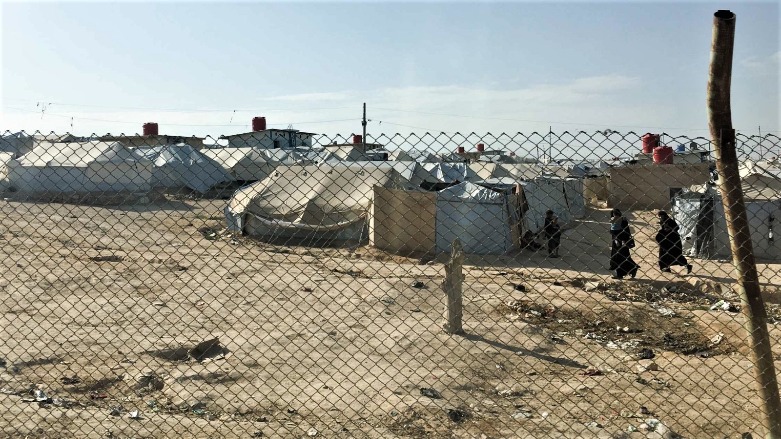8 killed at infamous northeast Syrian displacement camp in June: SDF

ERBIL (Kurdistan 24) - At least 8 people were killed last month at the sprawling al-Hol displacement camp that holds thousands of female ISIS suspects and their children in northeastern Syria.
The announcement came from the US-backed Democratic Forces (SDF), which run the facility that has seen alarming numbers of murders in recent months seen to be at the hands of residents loyal to the extremist group following its territorial defeat in the country.
“ISIS terrorist cells continued their activity inside al-Hol camp by carrying out more killings of residents who seek to get away from the extremist ideas of the group,” read the SDF’s latest monthly report released by its Military Observation Desk (MOD).
“During June, MOD recorded the killing of eight people of Syrian and Iraqi nationalities (that were committed) by shooting them in the head, and the wounding of a Russian woman.”
Moreover, the Kurdish-led SDF also said it had recently arrested 85 men, women, and children while they were attempting to escape from the camp.
The number of targeted killings at al-Hol has fallen slightly over the previous few months following a sweeping SDF security operation in late March aimed at identifying and capturing those responsible for the deaths and other crimes.
The number of killings in al-Hol, however, has begun to slowly increase again. Also on Monday, an additional Iraqi refugee was murdered at the camp that was not included in the count, the North Press agency reported.
A diplomatic source told Kurdistan 24 that, before the SDF security operation on March 28, approximately 50 people had so far been killed at the facility. “Then 2 in April, 11 in May, and 8 in June,” said the source, confirming that the total is just upwards of 70.
Multiple displaced Iraqis within al-Hol have been targeted in the past for alleged collaboration with the SDF, local Asayish security forces, or camp administration.
According to the United Nations al-Hol is the largest camp for refugees and internally displaced people in Syria, with roughly 60,000 residents. As a result, says the SDF, it has been difficult for guards to prevent security incidents in the camp.
The majority of residents are Iraqis, approximately 31,000, followed by Syrian nationals in second place, but the camp also includes a large number of those from other nations accused of ISIS affiliation, plus their children.
Local authorities want to reduce pressure on the camp by repatriating Iraqis and other foreigners to their home countries, but have met with considerable resistance. In October, they attempted to both expedite and increase the departure of displaced Syrian families as part of a new reform program that has never been implemented.
Also in May, Iraq repatriated 381 of its nationals following a deal to bring them to a refugee camp in northern Ninewa province, a USAID report stated last month.
Read More: Hundreds of Iraqis repatriated from Syria camp: Kurdish official
The report added that 80 percent of recently surveyed Iraqi refugees at al-Hol expressed a desire to return home.
However, the Iraqi government only identified a further 1,600 Iraqis believed to be unaffiliated with ISIS who it said would be allowed to return in the foreseeable future.
In addition to attacks in al-Hol camp, the SDF announced that ISIS had carried out 11 attacks in northeastern Syria in June, but that, with the support of the US-led Coalition to Defeat ISIS, had arrested 57 wanted persons, “most of whom are members of terrorist cells in separate areas.”
Although the SDF and coalition announced the “territorial defeat” of ISIS in Syria in March 2019, the group continues to carry out regular sleeper cell attacks in northeastern Syria, with a focus on Deir al-Zor province along the Iraqi border.
Editing by John J. Catherine
